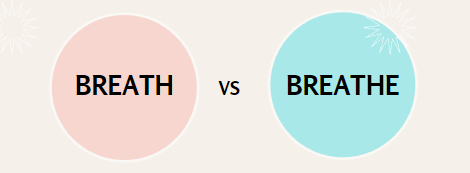Navigating the Nuances of 'Breath' vs 'Breathe' for Clear Communication
Contents

Have you ever been confused about when to use 'breath' and when to use 'breathe' in English? It's a common dilemma for many language learners, but fear not! In this article, we aim to provide a clear explanation of breathe vs breath meaning and usage, so that you can navigate these nuances with ease.
These two words may sound similar, but they have different meanings and functions. Mastering their correct usage will greatly enhance your proficiency in English.
Understanding when to use each word is essential for effective communication. Confusing them can lead to misunderstandings or even unintentionally change the entire meaning of a sentence.
Throughout this article, we will provide you with clear explanations, examples, and tips to help you navigate these nuances with ease. So let's dive in and explore the meaning and usage of 'breath' and 'breathe' together!
Meaning and Pronunciation
Understanding the meaning and pronunciation of words is vital for effective communication. Let's delve into breathe vs breath meanings individually, with examples, to help you differentiate between them.
1. Breath (noun): The air taken into or expelled from the lungs during respiration
Example: After running a marathon, she took a deep breath to calm her racing heart.
2. Breathe (verb): To inhale and exhale air actively.
Example: It's important to take breaks and breathe deeply when feeling overwhelmed by stress.
Now that we have explored their meanings, let's focus on their distinct pronunciations.
Pronunciation plays a crucial role in conveying our intended message accurately. To help you master breathe vs breath pronunciation, here are the phonetic transcriptions:
'Breath': This word is pronounced as /brɛθ/, with a short vowel sound (/ɛ/) and a soft /θ/ sound at the end.
'Breathe': The verb form has a longer vowel sound (/i:/) before the /ð/ sound at the end, making it /bri:ð/.
Here's a table with breathe vs breath pronunciation at a glance:
Word | Phonetic Transcription | Sounds Like | Audio Sample |
Breath | /brɛθ/ | breth | [audio] |
Breathe | /bri:ð/ | breeth | [audio] |
Now that you understand both the meaning and pronunciation of 'breath' and 'breathe', you can confidently use these words in your conversations. Practice saying them aloud to enhance your pronunciation skills.
Remember, clear communication starts with mastering essential vocabulary like 'breath' and 'breathe'. By learning their meanings, differentiating between them, and practising their correct pronunciation, you will be able to express yourself accurately in English.
Next, we will explore the usage of these words and look at some breathe vs breath examples associated with 'breath' and 'breathe'. Stay tuned for more insights on how to effectively incorporate these words into your daily English conversations.

When to Use 'Breath' and When to Use 'Breathe'?
Navigating the nuances of 'breath' and 'breathe' can sometimes be confusing, but fear not! We're here to provide you with clear guidelines on when to use each word, ensuring your communication is always precise and accurate.
Using 'Breath':
As a noun, 'breath' refers to the act or process of breathing, as well as a single inhalation or exhalation. It's important to remember that 'breath' is used to describe the concept or action of breathing itself.
Here are some examples:
Take a deep breath before speaking in public.
Hold your breath while diving underwater.
He had bad breath after eating garlic.
In addition to these examples, there are also common idioms and phrases containing 'breath'. These phrases add depth and richness to your language while accurately conveying your intended meaning. Some examples include:
A breath of fresh air - meaning something new and refreshing
Out of breath - being physically exhausted after exercise
Bated breath - waiting anxiously for something
Using 'Breathe':
As a verb, 'breathe' indicates the intentional action of inhaling and exhaling air. It's about actively taking in oxygen and releasing carbon dioxide from your lungs. By using 'breathe', you highlight the conscious act of inhaling and exhaling air for various purposes such as relaxation, rejuvenation, or simply improving your overall well-being.
Consider these examples:
Take a moment to breathe deeply and relax.
Breathe in the fresh air during your morning walk.
He couldn't breathe properly due to his allergies.
Common idioms or phrases containing 'breathe':
Breathe down someone's neck - to closely monitor or supervise
Breathe new life into something - to revitalize or rejuvenate
Breathe easy - to feel relieved or relaxed
Understanding the difference between these two words will greatly enhance your ability to express yourself clearly. Remember, 'breath' is a noun describing the act or process of breathing, while 'breathe' is a verb representing the intentional inhaling and exhaling of air.
Translations in Indian Languages
To help our Indian learners understand these words better, we have compiled translations and interpretations of 'breath' and 'breathe' in multiple Indian languages. Here are the translations in Hindi, Bengali, Telugu, Tamil, Gujarathi, Oriya, Assamese, and Urdu:
Language | Breath | Breathe |
Hindi | सांस (saans) | साँस लेना (saans lena) |
Bengali | শ্বাস (shwas) | শ্বাস নিতে (shwas nite) |
Telugu | ఊపి తీయడం (oopi teeyadam) | ఊపి చేయు (oopi cheyu) |
Tamil | மூச்சு (moochu) | மூச்சு எடுக்க (moochu edukka) |
Gujarathi | સાંસ લેવી (saans levi) | સાંસ લેવું (saans levu) |
Oriya | ସାଣି (sani) | ସାସ ନିଅନ (sasa nian) |
Assamese | শ্বাস (shwas) | শ্বাস নিওঁ (shwas niom) |
Urdu | سانس لینا (saans) | سانس لینا (saans lena) |
Please note that these translations should be considered as guideposts and may vary in different regions or dialects.
To assist with pronunciation, we recommend using online resources such as Clapingo's pronunciation guides.
These guides can help you learn the correct phonetic representation of the translated words, making it easier for you to pronounce 'breath' and 'breathe' accurately in each language.
Now that you have the translations at your disposal, you can confidently express yourself in multiple Indian languages when discussing 'breath' and 'breathe'. Remember, clear communication is key, and understanding the nuances of words is a crucial step towards achieving fluency.
Winding Up
Now that we have explored the nuances of "breath" and "breathe" for clear communication, let's recap the key points covered in this article.
First and foremost, it's important to understand the difference in meaning between "breath" and "breathe". "Breath" refers to the air we take in and release from our lungs, whereas "breathe" is the action of inhaling and exhaling that air.
Pronunciation plays a crucial role in distinguishing between these two words. While "breath" sounds like /brɛθ/, "breathe" is pronounced as /briːð/.
Now that we have reviewed these key points about breath and breathe, let us introduce you to Clapingo—an online English learning platform that offers comprehensive courses to improve your spoken and written English skills. With Clapingo, you can enhance your understanding of grammar rules, vocabulary-building techniques, sentence formation strategies, pronunciation exercises, and much more. By joining Clapingo's courses specifically designed for Indian learners like you, you can gain confidence in using English for professional and personal development.
To learn more about Clapingo's offerings or to enrol in a course today, visit their website at www.clapingo.com.
FAQs
1. How to remember breathe vs breath?
Remembering the difference between 'breathe' and 'breath' can be made easier by focusing on their roles in a sentence. Think of 'breathe' as an action that you do, while 'breath' refers to the air you take in or exhale.
2. How do you use breathe and breath in a sentence?
To use these words correctly, let's look at some examples:
Breathe: "Take a deep breath and slowly breathe out." Here, 'breathe' is used as a verb to describe the action of inhaling and exhaling.
Breath: "Her breath caught in her throat as she saw the breathtaking view." In this sentence, 'breath' is used as a noun to refer to the air taken into the lungs.
3. Can 'breath' ever be used as a verb?
While 'breath' is primarily used as a noun, there are instances where it can be used as a verb. However, it is less common and often considered archaic or poetic. For clear communication, it is recommended to use 'breathe' as the verb form.
4. What if I mistakenly use 'breathe' instead of 'breath', or vice versa?
Don't worry! Mistakes happen, even for native English speakers. The important thing is to learn from them and correct them moving forward. In most cases, the listener or reader would be able to understand what you mean from context.
If you accidentally use 'breathe' instead of 'breath', or vice versa, simply take note of the correct usage and make a mental note to use it correctly in the future.
Comments
Your comment has been submitted